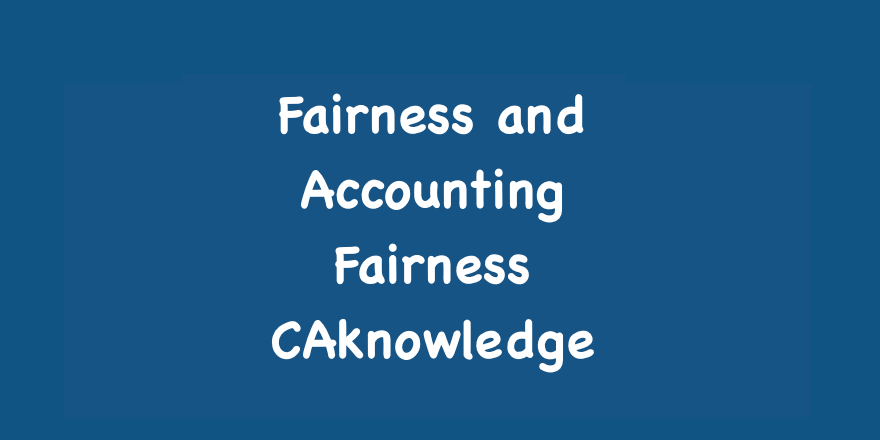Fairness and Accounting Fairness: Some words, frequently used in accountancy, do not connote its etymological or philosophical meaning. This paper tries to find the gap between the philosophical meanings and its usage in accountancy which serves as the cornerstone to build the core of the subject.
The philosophical concept of the three words: fairness, justice and truth are discussed with its philosophical meaning and later on its aberration in accounting. The relevancy of writing stands as to reassess the gap which could be a conduit to financial irregularities and fraud. It also shows the inability to judge the real situation by the investors as the words lost their impact in accounting arena.
As those concepts are the basic attributes of financial statement, it deteriorates the quality of reporting. The logical pointer towards the departures shows the areas where the investor awareness can be beefed up. It talks less about the importance of ‘adoption’ or ‘convergence’ and more about the distributive justice to every individual investor through final report
Fairness and Accounting Fairness
The concept of fairness has been described from different angles in different perspectives. If it is aligned with equality, fairness is known as the quality of making judgment that is free from discrimination. In other words, it is the quality of treating people equally or in a way that is right or reasonable. In a reverse way of understanding, fairness is posed as self centered inequity aversion.
Inequity aversion stands as people resist inequitable outcomes. With the base of conformity, fairness can be considered which conforms to the rules and standards in the light of provision of opportunity or in result. Sometimes, action is considered as fair if the intention behind the action is kind and as unfair if the intention is hostile. But the term which is very close to fairness and used
interchangeably is ‘justice’. Several times fairness is defined in the light of justice. In his ‘A Theory of Justice’, John Rawls (1971) used a social contract argument to show that justice is a form of fairness, an impartial distribution of goods. John Rawls claimed that justice is the first virtue of the social institutions, as truth as systems of thought. But justice as fairness is more context bound. For resembling with the rules, parties adopt procedures which ultimately stand as fairness.
The procedures adopted in different aspects are known by the situation it is adopted for. In case of society, social justice is justice in terms of the distribution of wealth, opportunities and privileges within a society. Social justice assigns rights and duties in the institutions of society which enables people to receive the basic benefits and burdens of cooperation. If the mass of the social goods or the residuals are allocated in a just way, it is said that distributive justice has taken place.
In other words, if there is an incidental inequity, it is distributive justice the people look for better acceptance. In the process, if there is a dispute, it is the procedural justice which requires carrying the notion of fairness. At the time of rendering the justice, if the affected party is not treated with dignity and respect, it is normally said that interactional justice has not been restored. Fairness in dealing stands as interpersonal justice and informational justice.
Accounting is a technique to record the wealth managing activities. The owner of the wealth expects a fair dealing from its initial use. Unfair reporting to the owner creates suspicion about the activities of their agents. The repeated occurrence of several financial frauds raises doubt about the understanding of the concept of fairness from the point of investors and the auditors. Investors get unnerved as their fellow financiers are cheated, as in reality, majority of them are not acquainted with the facts. Thus, fair reporting is the only feedback from the people who handle their money
Fairness is best understood in the professional accounting as an expression of the neutrality of the accountant in the preparation of financial reports. Fairness in accounting is considered as the basic standard which is applied to measure other standard (Patillo, 1965) as it implies ‘ethical considerations’. In case of auditor who being fair, is meant complied with standard which is created by his own (Kohler, 1967).
Lev (1988) has advocated equity win semblance to fairness. But it also differentiated equality of opportunity with the equality of outcome and equality of opportunity is the sole principle of justice guiding government’s decisions. William (1987) linked accounting with efficiency with distribution which attracts the distributive justice..
Must Read
- Justice and Accounting Justice
- Truth and Accounting Truth
- Accounting Concepts & Conventions
- Accounting for Rectification of Errors
- Fundamentals of Accounting
Practice of fairness depends on the objective and strategy of the issue. Gradually, the methods of creativity, based on the rules of accounting, has unfurled many dimensions, most of them are not easy to diagnose by the investors in general. So, fairness evolves in the mind of the governing people, at first, which is basically reflected in the report through accounting. Development of honesty, integrity and morality of the management depends on the shaping of their character from the age of becoming.
Justification of fairness remains subjective. The rule based standard of accounting has tried to reduce the subjectivity and unwanted creativity in the report. But, it also stimulates the recorders to be financially strategic as per the objective of the governance. So, fairness remains uncared for.
